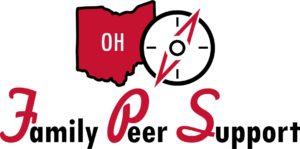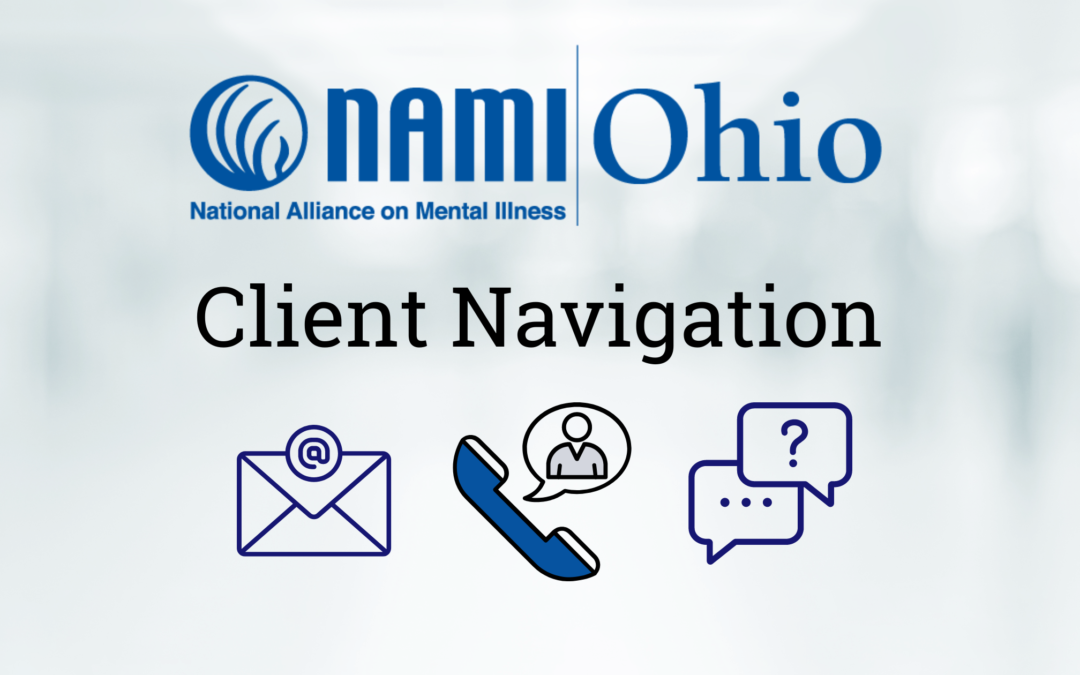
by NAMI Ohio | Dec 23, 2022 | News & Updates
Mary’s sister had been in a Columbus psychiatric hospital for two weeks this past summer, and despite daily calls to the hospital, Mary had been unable to reach the hospital treatment staff.
Not once. In two weeks.
As days passed, Mary, who lives in Marietta, Ohio, 125 miles from Columbus, grew increasingly worried about her sister who had been hospitalized several times in the past to treat her bi-polar disorder.
This time was different, however. Mary’s sister had never suggested suicide before, saying she was “too chicken” to take her own life.
“I’m not chicken anymore,” she told Mary in a phone call from the hospital. She did not feel like she was ready to go home, but the hospital staff planned to release her the next day.
Now fearful, Mary called the Washington County Behavioral Health Board in Marietta where she was referred to the National Alliance on Mental Illness of Ohio Helpline (800 686-2646 or Text NAMI to 741741).
A short time later, Mary talked by phone to Danielle Smart, NAMI Ohio Client Navigator, who handles the majority of helpline calls.
“Danielle helped so much,” Mary said. “She called the hospital and they returned her call right away. The hospital director of treatment called me the next morning.”
As a result of NAMI’s help, Mary’s sister was transferred to a different hospital wing with more intensive counseling where she remained for another 10 days before being released to safely return home.
“I feel so grateful I made that call and that Danielle listened to me actively,” Mary said. “Everything went to plan about what she said after that.”
Call NAMI. They’ll be able to help.
Mary’s call was one of more than 2,500 contacts to the NAMI Ohio Helpline since March of 2022 when the Client Navigator role was created.
NAMI Ohio Executive Director Luke Russell said the organization “has operated a Help/Referral line for years. We have always wanted people calling to have a real person they could talk with and guide them to the best resource.”
Helpline calls were answered by NAMI’s trained staff, but the duty rotated, with many calls being handled personally by the executive director.
This year, Luke continued, “the need arose for someone with social work and clinical skills to be added to handle the increase in tough calls from individuals and families in serious need of mental health services and supports.”
That resulted in the hiring of Danielle Smart as NAMI Client Navigator and, with it, the formalized, private tracking of calls detailing the problem, actions and results.
“The opportunity to have someone answer and follow up on calls came about with some extra funding from the COVID19 dollars and the NAMI Ohio Board prioritizing this role as we advocate for an increase in care management and coordination for those most in need,” Luke said. “The mission at NAMI Ohio is to educate, advocate and support individuals with mental illness and their families, and the role of the Client Navigator directly supports those we are here to represent.”
Danielle is the main point of contact for those contacting NAMI Ohio seeking services, support, education, housing, and crisis intervention services. Her job includes building strong relationships with NAMI staff and the statewide network of affiliates, 2committing to removing barriers to care by identifying critical resources for individuals and families, assessing needs of callers to NAMI Ohio’s crisis line, and doing follow-ups to see that needed help is being received from local providers and support services.
Danielle was a NAMI Ohio intern from June 2020 to April 2021, and has a decade of experience as a social worker after graduating from Ohio State University with Master’s and Bachelor’s degrees. She is a licensed social worker and a native of Bellefontaine in Logan County, Ohio.
Handling the Helpline
She manages the NAMI Ohio Helpline from 9 a.m. to 5 p.m. weekdays; calls are answered remotely after hours. She also responds to email messages and in-person contacts at events.
Helpline callers can provide as much or as little information as they feel comfortable giving, Danielle said. “My focus is for people to get connected to the resources they need.”
The length of the call depends on the needs of the caller.
“Sometimes they just need to talk,” Danielle said. “Some of the toughest calls are talking to a parent whose child is going through a mental health crisis. I spend as much time as I need to.”
One person called with concerns about an aging parent. “They love this person so much and they don’t know what to do. The hopelessness and pain can make people feel completely lost.”
Danielle said direct services were the subject of the majority of calls, followed by support assistance, business-related, multiple needs, housing, and crisis calls.
“Being a social worker is a privilege,” Danielle said. “I truly enjoy talking to people…. The best parts are when you’re able to help someone. That’s such a great feeling, like a warm hug. I love when I’m able to solve something for someone that they didn’t know how to do.”
“I like talking to people who are disenfranchised to help them advocate for themselves. Things get better with a quality of care.”
And sometimes, the one who helps others so much needs a helper, too. Danielle said she depends on a personal therapist, family and friends to help keep her balanced as she takes on the burdens of so many others.
Click Here to watch a recent Instagram conversation with Danielle and NAMI Ohio supporter musician Torrian Ball
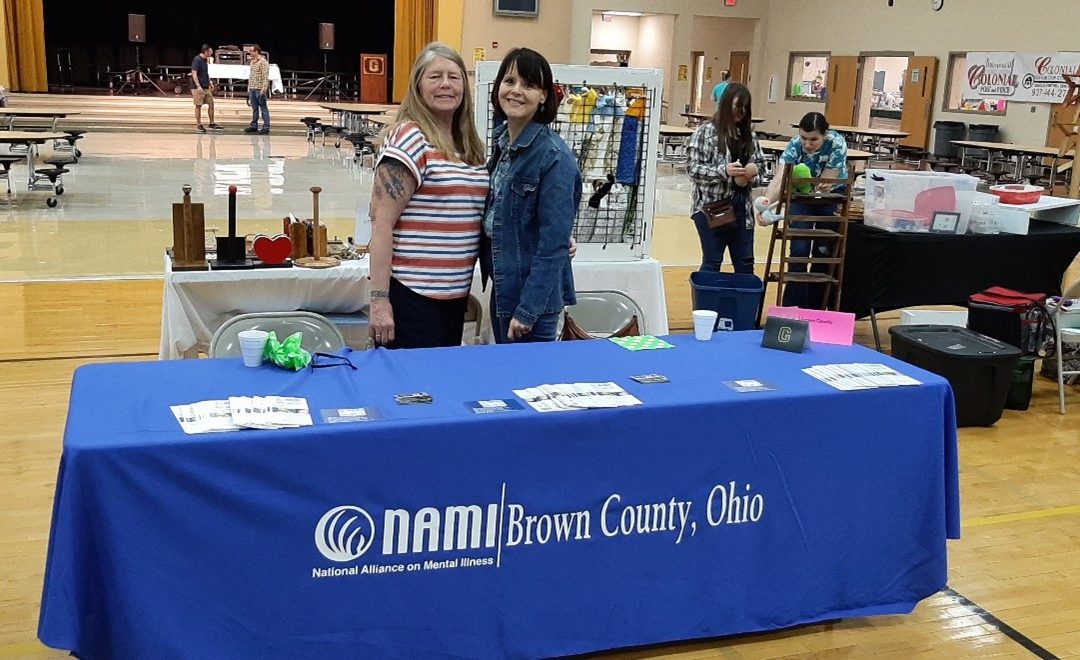
by NAMI Ohio | Dec 2, 2022 | Blog, News & Updates
Written & Submitted By: Danei Edelen
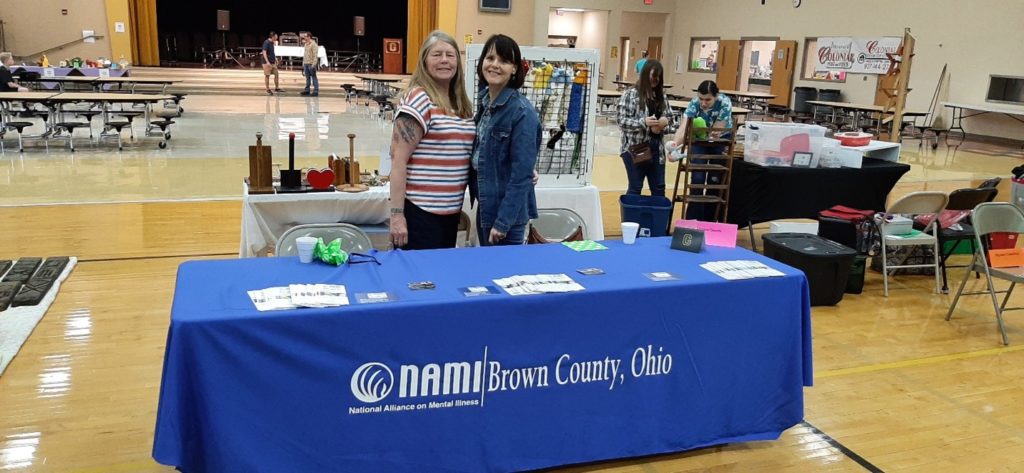
Nothing says spring like the feeling of fresh air blowing through our house on a warm spring day like the afternoon after the Georgetown Community Day at Georgetown Elementary. After two years of isolation, I think everyone was looking for an excuse to get out of the house and be around people again. “Working a booth” was a quiet victory for both Anita and I. Anita and I had met five years earlier when I founded NAMI Brown County. We have been through a lot in the last five years, the death of her son, me being hospitalized three times, COVID, and the war in the Ukraine. As I remarked to Anita in the car, “We are just grateful to be well enough to work a booth”. Welcome to a new chapter in our lives. Watching Anita console a grieving mother with the touch her hand, validated again for me today why I founded NAMI Brown County. “Together, we are making a difference, one day at a time, one life at time.”
My name is Danei Edelen. I am founder of the NAMI Brown County Ohio affiliate. In July, we will be celebrating five years for NAMI Brown County at the Child Focus on July fourteenth. Becoming known in my community as founder of NAMI Brown County brings me a quiet thrill. In April, I spoke at the Brown County Chamber of Commerce luncheon to tell people about the party. I was so nervous, that I could hardly touch my food. A woman from one of our community banks came up to me at our NAMI booth at the Georgetown Community Day and told me I had done a nice job. “Why, thank you!” I said with profound relief.
Part of the reason this party means so much to me is because I have lost two people in my life to suicide as well as having my own suicide attempt. I have lived through that dark night of the soul related to suicidal thoughts. NAMI was a lifesaver for me. I am convinced that if had known about NAMI before, I would have found the help I needed.
Suicide has become an epidemic in this country. Suicide is now the second leading cause of death for people ages 10-34. The 988 Implementation Act, introduced by Congressman Tony Cárdenas, provides federal funding and guidance for states to implement a 988-phone number to replace 911 for mental health crisis calls. The 988 Implementation Act provides funding for a crisis response infrastructure that relies on trained mental health specialists instead of armed law enforcement. NAMI Brown County also has free Zoom calls on the second and fourth Thursday of the month. If you or someone you know is struggling, please know that you are not alone. Anita and I are living proof that there is life after a mental illness diagnosis.
Learn more about Danei and download a copy of the article HERE
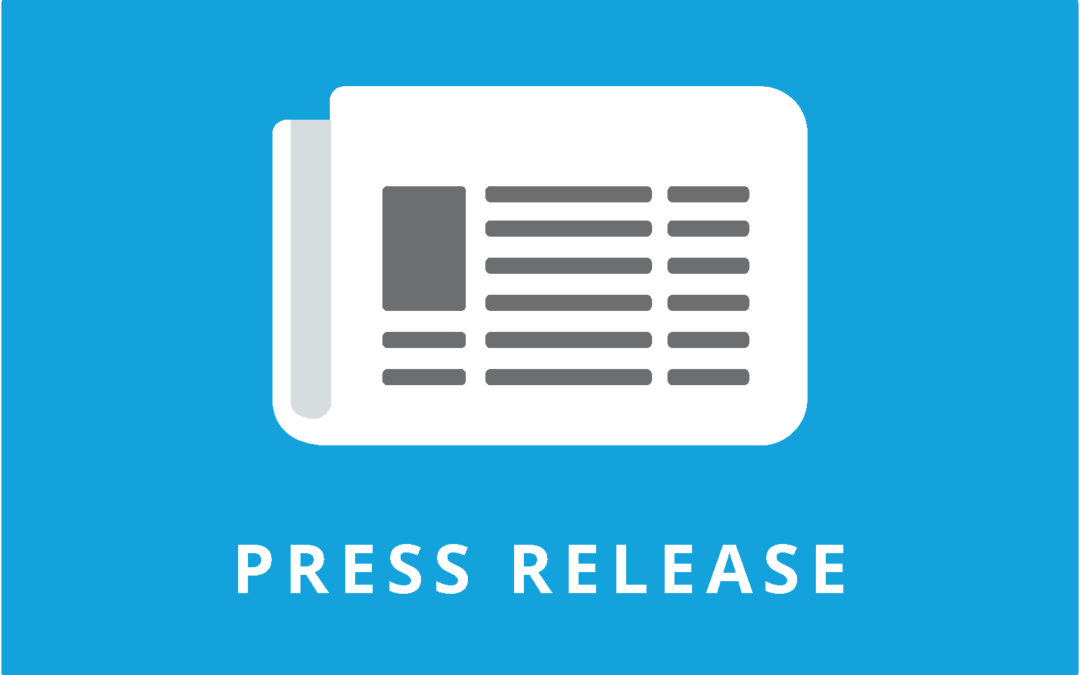
by NAMI Ohio | Dec 2, 2022 | News & Updates
COLUMBUS, OH: Vowing to remedy “unfinished business” from decades ago when thousands of people were released from psychiatric hospitals without adequate treatment, Ohio Gov. Mike DeWine announced a plan to greatly expand community services for those with mental illness.
Gov. DeWine said “tragically” neither the state of Ohio nor other agencies across the nation followed up with the necessary treatment for those who exited hospitals beginning during the administration of President John F. Kennedy. That failure resulted in large numbers of people struggling with untreated mental illness often ending up homeless, filling hospital emergency rooms, or being incarcerated.
The governor’s plan, which will be presented to state lawmakers next year in his budget, will include a “behavioral-health research hub,” an in-depth study of the causes of mental health and addiction issues, and expansion of community services. Cost figures for the proposal were not released.
NAMI Ohio Executive Director Luke Russell said NAMI Ohio, the state’s largest grassroots organization advocating for the mentally ill, their families and caregivers, enthusiastically supports Gov. DeWine’s proposal and applauds his “willingness to be a champion so individuals and families have hope that they will have to no longer live in the shadows.”
“NAMI Ohio stands ready and willing to work with the Governor and State Legislature to prioritize a person-centered approach to mental health treatment that has not been part of the current treatment model,” Russell continued. NAMI Ohio wants to ensure support services such as Housing, Day Services and Client Navigation become a reality for individuals with serious mental illness and their families.
“Every family, workplace and community is impacted by mental illness and the time to challenge the status quo is here,” Russell said. “We appreciate Gov. DeWine’s focus to address a system that was never built when as a nation we decided to close the large psychiatric Institutions. Individuals not only needed the community treatment services, but also support services that give a quality and dignity of life all people deserve.”
The governor outlined his proposal this week at summit sponsored by the Ohio Chamber of Commerce. “We must – we must – change this. We must now make behavioral health visible, accessible, and effective in all communities in Ohio,” he said.
Gov. DeWine also renewed his plan to spend $85 million in COVID19 aid from the federal government to help boost employment for mental health workers and internships.
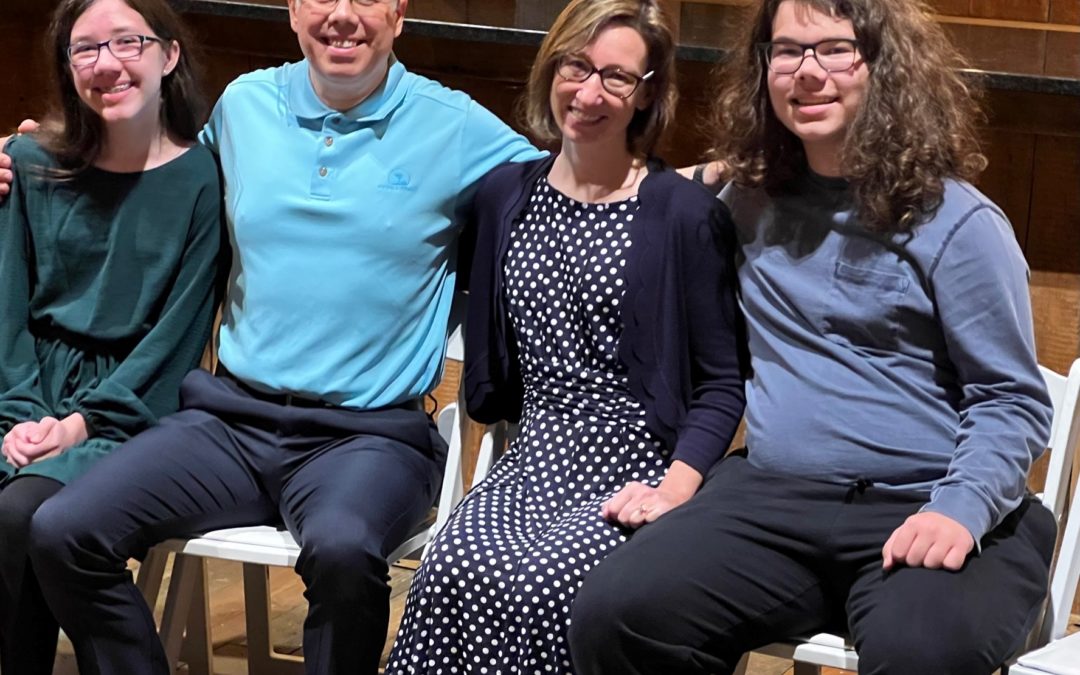
by NAMI Ohio | Oct 14, 2022 | Uncategorized
Written by Alan Johnson, NAMI Ohio

Mental illness is a mean disease.
It can come unexpectedly, hide in plain sight, and cause unbearable grief.
Kristin Jonsson knows that grief first-hand. She has suffered every day of the two years since Kristine, her smart, kind, artistic, sensitive and beautiful daughter, took her own life at the age of 16.
Katherine, Kristine’s younger sister, knows the mean disease, too. “When I first found out, I was in shock,” she said. “I didn’t fully understand what had happened.”
That’s where the story ends for too many people who have lost a loved one to suicide. They simply go on grieving.
But not this story. Not for Kristin and Steinn, her husband, or for Katherine and her brother, Daniel. Not for a family determined to make Kristine’s life stand for something beyond how it ended,
“I don’t want other families to go through the pain my family is living through,” said Katherine, now 12. “I want people to know that it’s ok to not be okay, and that it’s important to reach out for help.”
With Katherine taking the lead, the family participated in the annual NAMI Walk sponsored by NAMI Franklin County. Katherine raised $2,223 as part of Team Kristine which raised $4,573. Both figures were tops in the Franklin County event which collectively brought in $68,043.
Katherine and her family were honored with awards at the NAMI Franklin County annual meeting on Oct. 5th at the Wells Barn at the Franklin Park Conservatory. Katherine received the Youth Advocate of the Year Award, and the family was recognized for being the top walk fundraisers.
The Jonssons received not one but two standing ovations.
Two Years Ago
It was just two years ago, in the midst of the isolation of the COVID19 epidemic, that Kristine shocked her family by ending her life.
“We weren’t remotely prepared,” said the girl’s mother. “None of this was on our radar. To outside appearance, she was happy and doing better. We know now that she clearly had depression, but it wasn’t the stereotype that people think of. We were blindsided.”
Kristine did not threaten suicide, but she left her family letters to be read after she was gone explaining her struggle with depression and anxiety. “She knew she could have asked for help, but she didn’t. Mental health in our family wasn’t a stigma. I have a history of depression and anxiety and she knew that,” Kristin said. “I don’t know why she felt she had to hide it. I don’t know if it was because of the pressure from the outside and the society we live in that does not treat people with mental illness well.”
Meeting of Two Worlds
Kristin met her future husband, Steinn (friends call him Stan because his name in Icelandic is too hard to pronounce) when they were both working in California. After they married, and with Kristine, their first-born on the way, they moved to Ohio, where Kristin is from. Stan is from Iceland. The couple and their two children, Kristine and Daniel, lived in Iceland for three years before returning to Columbus. It was there, in the land of fire and ice, that Katherine was born. She has dual citizenship in the U.S. and Iceland.
The couple noticed that Kristine, their first child, was struggling.
Kristine was a “cuddly and sweet baby,” but “was never good at sleeping” and had a difficult time when separated from her family members. “We noticed when she was three and we put her in pre-school for the first time, she cried and cried,” Kristin said. “That’s normal at first but she never got past it.”
By age 6, Kristine had been diagnosed with both separation anxiety and sensory integration disorder, which made her extremely sensitive to being touched and wearing certain kinds of clothes. Coupled with the sleep disorder, the young girl was dealing with “a trifecta of issues,” her mother said, made more difficult by the upheaval of the family’s move to Iceland and back to Ohio three years later.
To appease Kristine when they returned to Columbus, her parents got her a cockatiel which the family named Rainbow. The bird was special to Kristine, her baby. She trained Rainbow to wear a leash so she could take him on walks perched on her shoulder. She enthusiastically introduced him to people she met.
Smiling Depression
The Jonssons sought help for their daughter, getting her counseling, occupational therapy, and medication. It all seemed to help. By the time Kristine was 12, she was doing well academically in school, had made many friends, and was liked by her teachers. She was a talented artist, producing dozens of drawings and paintings.
“After 12, what we think happened is she started to hide it,” her mother said. “We thought she was doing better. She wasn’t crying anymore. She had all these friends. She took these advanced classes because she wanted to. We didn’t push her…. We thought she was a teenager forming her own identity.”
But inside, things were different.
“There was this disconnect between how she appeared on the outside to everyone, including us, and what was going on the inside.”
“We do everything to make our home as welcoming and gentle and kind and loving as we possibly can, but we still live in society,” Kristin said. “We can’t control those outside influences. I know kids in high school joke about suicide. They joke about mental illness. Inside my heart, I wonder if she didn’t reach out for help because she heard it from other people.”
The Little Sister
There was a six-year age difference between Kristine and Katherine, but they enjoyed being together, drawing, doing arts and crafts, listening to music, or reading side by side. Kristine introduced her sister to some of her favorite books, including Harry Potter and the Wings of Fire series.
“She was kind and funny and could be sarcastic, too,” Katherine said. “We were very close.”
When she lost her sister, Katherine was overwhelmed with emotion, sad and confused, but also somehow feeling guilty that she should have known Kristine was so troubled. “I know that I couldn’t have done something. But I feel like I should have.”
Finding NAMI
Finding NAMI broke through the gloom of grief and sadness for the Jonsson family. Kristin read about the NAMI, the largest grassroots group in the nation dedicated to help those with mental illness and their families, and decided to investigate.
“NAMI has a wealth of information,” Kristin said. “It’s accurate and it’s helpful. They are trying to make a difference in the world in a way that hardly anyone is trying to make a difference. It’s cool to raise money for cancer. But raising money for mental illness is just as important.”
“I thought it was awesome that there are people that can form an organization and make things better about mental illness,” Katherine added.
Kristin embraced NAMI’s mission of ending stigma about mental illness, something she felt acutely when she lost her daughter.
“People treated her passing differently than they treat it when someone dies like in a car accident, for example. There was some blame and some stigma and an unwillingness to even acknowledge that she existed. It was very hard for me.”
Asked how she thought her big sister would feel about the fundraising and work she’s done to raise awareness about mental illness, Katherine paused and said through tears, “I think she would be a little shocked, but she would be impressed and proud of me.”
Katherine says the ordeal has inspired her to think about becoming a teacher and help future generations of kids overcome the stigma that may have contributed to losing her sister.
Kristin likewise thinks her oldest child “would be very proud of Katherine. She would look down and give her a big hug.”







